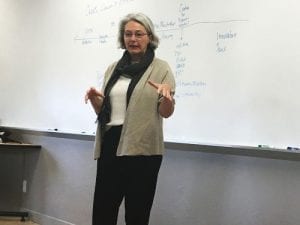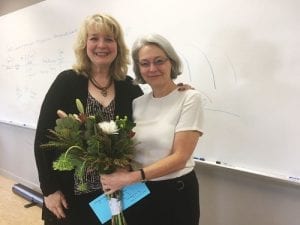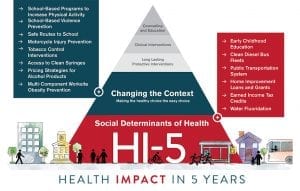Impacting Public Health in Communities Using Innovations in Law and Policy
Among the seven commitments we made to ourselves and our community when we formed Blue Beyond Consulting a decade ago, the first was this: Business is a force for good. And of all the clients we have engaged, ChangeLab Solutions, an organization that helps create healthier communities using innovation in law and policy, is a real testament to that promise.
 You might take for granted many of the things that make your community more livable and healthy: smoke-free housing, public spaces, access to healthy food, pedestrian-friendly streets. All those things impact public health on a massive scale. The healthy context of a neighborhood’s infrastructure make the healthy choice, the easy choice. For example, if you want people to move more, a neighborhood needs accessible sidewalks. Those infrastructure changes don’t happen by accident; they happen by planning, foresight, and innovative policy and legal initiatives. This is especially true in lower-income areas of the United States. Historically, there has been little interaction between public health officials, (especially those dedicated to chronic disease prevention) and city and regional planning officials.
You might take for granted many of the things that make your community more livable and healthy: smoke-free housing, public spaces, access to healthy food, pedestrian-friendly streets. All those things impact public health on a massive scale. The healthy context of a neighborhood’s infrastructure make the healthy choice, the easy choice. For example, if you want people to move more, a neighborhood needs accessible sidewalks. Those infrastructure changes don’t happen by accident; they happen by planning, foresight, and innovative policy and legal initiatives. This is especially true in lower-income areas of the United States. Historically, there has been little interaction between public health officials, (especially those dedicated to chronic disease prevention) and city and regional planning officials.
ChangeLab Solutions is an organization working hard to change that tying equity to policy. They worked with local governments and community organizations by creating model laws making it easy for governments to say yes. They blended community organizing and grassroots advocacy to empower people with strong legal tools to impact change.
With the help of the Robert Wood Johnson Foundation and other funders, ChangeLab Solutions has been able to take their ground-breaking initiatives developed in and for California to the rest of the nation. From public health initiatives, air-tight laws they’ve honed and community organizing resources that they developed, they are tackling issues such as tobacco control, childhood obesity, access to public parks, transportation alternatives, and healthy planning initiatives.
 Marice Ashe, Founder and Executive Director of ChangeLab Solutions recently came to Blue Beyond headquarters and spoke with our team about the trajectory that got her from a community-organizing public health practitioner to going back to school to learn how to use the law to have a stronger impact on the communities she set out to serve. Eventually, she formed ChangeLab Solutions at the critical juncture of the financial collapse in September, 2008. She engaged Blue Beyond to help create possibilities for an uncertain future: silo-busting, collaborative planning within the organization, creating vision, and working on Board development. But most importantly, Marice worked with Blue Beyond to push the boundaries of what was possible and access courage. As Marice said, “to help each team member within the organization meet their own potential and do the work of the nation that needed to be done.”
Marice Ashe, Founder and Executive Director of ChangeLab Solutions recently came to Blue Beyond headquarters and spoke with our team about the trajectory that got her from a community-organizing public health practitioner to going back to school to learn how to use the law to have a stronger impact on the communities she set out to serve. Eventually, she formed ChangeLab Solutions at the critical juncture of the financial collapse in September, 2008. She engaged Blue Beyond to help create possibilities for an uncertain future: silo-busting, collaborative planning within the organization, creating vision, and working on Board development. But most importantly, Marice worked with Blue Beyond to push the boundaries of what was possible and access courage. As Marice said, “to help each team member within the organization meet their own potential and do the work of the nation that needed to be done.”
Marice said, “I wanted to change the way public health was done. Public health was such an after-the-fact kind of profession. It was retroactive, responding to disease or crisis, rather than getting ahead of the curve, focused on prevention. At the time I started, I didn’t understand environmental law. Because of that, I was limited in what I can do. My goal was to get more education and change how to empower communities to understand how the law worked and change the law if need be.”
Early on, Marice and her colleagues were trying to get rid of tobacco billboards. Billboards were so powerful because advertising is an incredibly persuasive medium. Maris and her team at the time asked: can we put a team together to empower communities to challenge the tobacco companies? And better yet, how can you engage young people, the people who live in the affected neighborhoods to help lead that research? They were able to engage communities through the Girls and Boys Club by giving kids paper maps of their own neighborhoods and mapping the ads. How old are the people in the billboards? Where are the billboards? Who lives in those neighborhoods? There weren’t billboards in the wealthy neighborhoods in the Oakland Hills. The billboards were situated in the lower income neighborhoods where people of color were dying from lung cancer and emphysema in record numbers.
 The model of giving tools to community leaders, even teenagers, was the most influential work that they still strive to replicate over and over again. Right now we don’t have tobacco billboards in the whole US because of ChangeLab Solutions’ work. The next question they are tackling, “Can we get rid of junk-food billboards?” In west Oakland there are 37 liquor stores, but not one grocery store. It is a relatively small area. What can we do using land access law and tools to change policy?
The model of giving tools to community leaders, even teenagers, was the most influential work that they still strive to replicate over and over again. Right now we don’t have tobacco billboards in the whole US because of ChangeLab Solutions’ work. The next question they are tackling, “Can we get rid of junk-food billboards?” In west Oakland there are 37 liquor stores, but not one grocery store. It is a relatively small area. What can we do using land access law and tools to change policy?
The biggest change we can make is by changing the context at the bottom of the pyramid (see below). You affect lots of people all at once. It’s not one-on-one care; it is massive behavior change that impacts prevention. ChangeLab Solutions has created a massive toolkit for communities all over the country to use and replicate. They are changing public health outcomes by changing the rules of the game and empowering other communities to do the same.
Business (and law and policy) can be a force for good and we’re so proud to be a partner in the solution.
